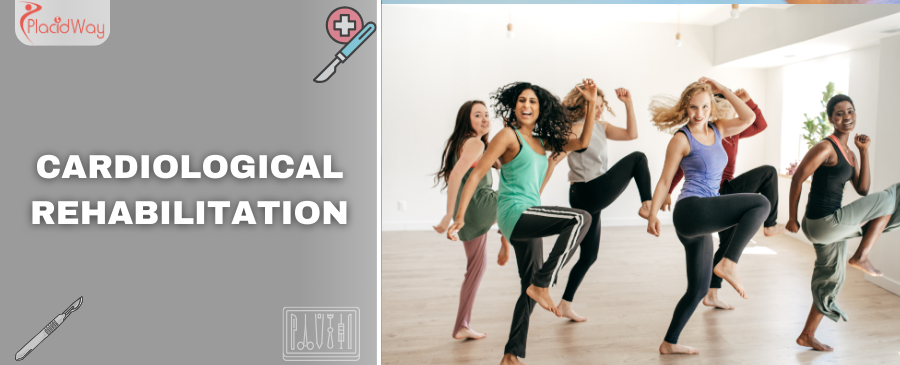
Table of Content
Key Insights at a Glance
- Cardiological Rehabilitation focuses on restoring heart function and improving quality of life after cardiac events.
- Comprehensive programs include exercise, education, and counseling.
- Costs can vary, with options in countries like India and Turkey being significantly lower than in Western countries.
- Accredited clinics and specialized centers offer personalized rehabilitation programs.
- Rehabilitation can take anywhere from 6 to 12 weeks, depending on individual progress.
What is Cardiological Rehabilitation?
Cardiological Rehabilitation is a medically supervised program designed to improve the health and well-being of people who have experienced heart conditions such as heart attacks, heart failure, angioplasty, or heart surgery. The rehabilitation program typically involves physical exercise, health education, and counseling to reduce the risk of future heart problems and promote overall cardiovascular health.
Symptoms Requiring Cardiological Rehabilitation?
- Shortness of breath during minimal physical activity
- Fatigue and lack of energy
- Chest pain or discomfort
- Swelling in the legs, ankles, or feet
- Irregular heartbeats or palpitations
Latest Types of Cardiological Rehabilitation Available in the World
| Rehabilitation Type | Description |
|---|---|
| Exercise-Based Rehabilitation | Includes aerobic exercises, strength training, and flexibility exercises tailored to improve cardiovascular function. |
| Psychosocial Rehabilitation | Counseling sessions to help patients manage stress, anxiety, and depression related to heart disease. |
| Nutrition Therapy | Dietary counseling to promote heart-healthy eating habits and weight management. |
To find out Different Packages for Cardiological Rehabilitation, Click here.
Safety Concerns Related to Cardiological Rehabilitation Abroad
- Proper evaluation of the patient's condition before starting any exercise program.
- Ensuring the facility has emergency response systems in case of cardiac incidents.
- Continuous monitoring of vital signs during exercise sessions.
- Availability of qualified medical staff during rehabilitation.
Benefits of Cardiological Rehabilitation Abroad
- More affordable treatment options compared to the U.S. or Europe.
- Access to world-class rehabilitation centers with experienced cardiologists.
- Personalized treatment plans tailored to each patient's needs.
Risks Associated with Cardiological Rehabilitation Globally
- Potential for overexertion leading to further cardiac issues.
- Risk of injury if exercises are not properly supervised.
- Possible complications from underlying medical conditions.
- Psychological stress due to being away from home for treatment.
Procedure for Cardiological Rehabilitation
The Cardiological Rehabilitation process generally involves the following steps:
| Step | Description |
|---|---|
| 1 | Initial assessment of cardiac health, including physical exams and tests. |
| 2 | Development of a personalized rehabilitation plan with exercise, nutrition, and lifestyle modifications. |
| 3 | Regular exercise sessions under medical supervision. |
| 4 | Education sessions about managing cardiovascular health and preventing future incidents. |
Cost of Cardiological Rehabilitation in the World | Compare Prices
| Country | Estimated Cost (USD) |
|---|---|
| Mexico | $3,000 - $5,000 |
| Turkey | $3,500 - $6,000 |
| Thailand | $4,000 - $6,500 |
| Colombia | $2,500 - $4,500 |
| India | $2,000 - $4,000 |
| Austria | $7,000 - $10,000 |
| USA | $8,000 - $12,000 |
| UK | $9,000 - $13,000 |
Find Prices for Cardiological Rehabilitation Near You: Click here.
FAQs Related to Cardiological Rehabilitation Overseas
What does Cardiological Rehabilitation cost without insurance?
The cost of Cardiological Rehabilitation without insurance can vary from $2,000 to $13,000, depending on the country and the level of care required. Countries like India and Colombia offer more affordable rehabilitation services compared to the U.S. or the U.K.
How long does a typical Cardiological Rehabilitation program last?
Cardiological Rehabilitation programs generally last between 6 to 12 weeks, depending on the patient's progress and specific health needs.
What activities are included in Cardiological Rehabilitation?
Activities typically include supervised exercise, health education, counseling for stress management, and dietary planning to promote heart health.
Is Cardiological Rehabilitation safe for older adults?
Yes, Cardiological Rehabilitation is safe for older adults when performed under medical supervision. The program is designed to match the patient's physical ability, ensuring safety and gradual progress.
Can I undergo Cardiological Rehabilitation if I have other health issues?
It depends on the specific health issues. Cardiological Rehabilitation is typically customized to accommodate other conditions, but it is important to consult with a healthcare provider before beginning.
Book Your Cardiological Rehabilitation Appointment Today
Ready to start your journey to better heart health? PlacidWay connects you with top-quality Cardiological Rehabilitation centers abroad. With personalized care, experienced medical professionals, and affordable packages, PlacidWay is here to help you regain your cardiovascular health and quality of life. Contact us today to schedule your consultation and take the first step towards recovery. Let PlacidWay guide you to a healthier heart!
Rehabilitation and Medical Spa Treatment





.png)
.png)

.png)

Share this listing